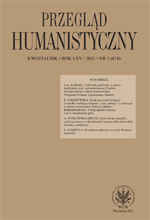Człowiek podziemny w prozie konfesyjnej oraz wspomnieniowej
Fiodora Dostojewskiego i Marii Komornickiej. Przypadek Notatek z podziemia
i Biesów
The underground man in confessional stories and memoirs.
The case of Fyodor Dostoyevsky’s Notes from the Underground and Maria
Komornicka’s Demons
Author(s): Aleksandra Anna KargolSubject(s): Philosophy, Language and Literature Studies, Studies of Literature
Published by: Wydawnictwa Uniwersytetu Warszawskiego
Keywords: Underground; confession; realism; nihilism; darkness; isolation; chaos; philosophy; Maria Komornicka; Fyodor Dostoyevsky
Summary/Abstract: This paper considers the idea of an underground man. It attempts to answer why writers reach for such a type of heroes and their position in the face of contemporary novel solutions. Maria Komornicka and Fyodor Dostoyevsky see in fallen individuals a source of creative inspiration. The confessional prose of these writers is an attempt to talk about the nihilist heroes who have chosen to live in a place of the metaphorical underground. The underground space becomes a construct of these works, and it is also a symbolic place where individuals desire chaos and darkness. The heroes of Demons and Notes from the Underground escape from where “everyone” lives and go underground, devoting themselves to underground mysticism because only such space protects them against the total collapse of the universe. Underground imagery governs the research process and shows how it determines the structure of a work and influences the methodology and ways of reading these works.
Journal: Przegląd Humanistyczny
- Issue Year: 474/2021
- Issue No: 3
- Page Range: 7-21
- Page Count: 15
- Language: Polish

